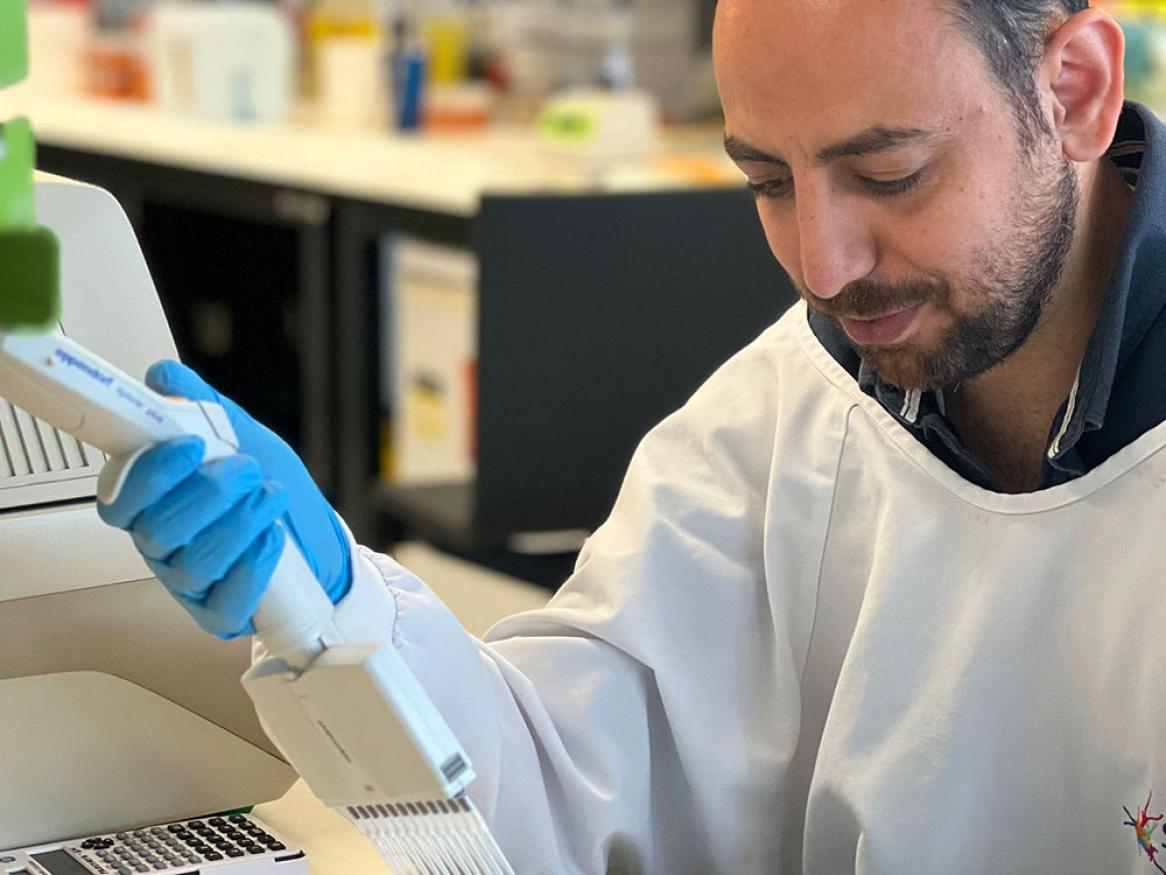Movember and SAiGENCI partner on landmark database to drive improvements in prostate cancer care
Movember, the leading global men’s health charity, has partnered with the South Australian immunoGENomics Cancer Institute (SAiGENCI) at the University of Adelaide, to create a transformative database that will help researchers develop strategies for clinicians to personalise decisions about prostate cancer care.

Professor Chris Sweeney, SAiGENCI Director and MSTIR Chief Investigator with Dr Holly Pinkney, postdoctoral researcher, studying data points for the project.
The database has been named MSTIR - Movember SAiGENCI Transformational Integrated Repository.
Prostate cancer is the second most commonly diagnosed cancer in men, and the fifth leading cause of cancer death among men worldwide, with an estimated 1.4 million new cases and 397,000 deaths each year1. Sadly, that burden is expected to double to 2.9 million cases by 2040, as the population continues to age. Over that same time, deaths are predicted to surge by 85%2, highlighting the very urgent need to make our current treatments more personalised and even more effective.
Over the last two decades, many biological and clinical datasets, from prostate cancer clinical trials and research studies around the world, have been collected. But this data is almost always analysed in isolation, never reaching its full potential.
Movember and the University of Adelaide recognise the profound insights that could be leveraged by combining and analysing these datasets. That’s why they're joining forces to develop MSTIR - a world-first, integrated database that will harness the power of innovative technologies like artificial intelligence and machine learning, to analyse the existing data obtained from analyses of tissue samples and clinical data from thousands of men worldwide enrolled in clinical trials. This is one of the most reliable strategies to identify new biomarkers. These insights will inform treatment strategies, ensuring each man gets the right treatment at the right time. It aims to stop aggressive prostate cancer from growing, coming back, or spreading rapidly.
“This cutting-edge technology represents a monumental leap in prostate cancer research. Allowing us to gather prostate cancer data from around the world and consolidate it in a single repository. By collecting and analysing biomarkers, we can unlock trends, enhance diagnostic pathways and improve the overall management and treatment of the disease. We are proud to see such revolutionary research being conducted here in Australia, and hope that it will play a role in minimising the global burden of prostate cancer in the future,” says Sarah Weller, Movember Global Director of Prostate Cancer.
"MSTIR is a world-wide collaboration bringing together many types of researchers from all around the globe to help unlock a new level of understanding of prostate cancer. This is an exciting and promising opportunity that could deliver more accurate diagnoses, more effective treatments, and improved outcomes for men battling this disease. At the very heart of this unique endeavour is the international team-spirit and collaborative sharing of data which is enabling the repurposing and integrating of existing valuable data."
The University of Adelaide has been at the forefront of the fight against cancer for decades. Launching MSTIR in the University's 150th year is very auspicious and we're incredibly excited to be able to add to the many discoveries that have and are emanating from the University of Adelaide. We're incredibly excited to see what kind of discoveries come out of this. The team at the University of Adelaide is honoured to partner with Movember to make this project possible.Professor Christopher Sweeney, Director, SAiGENCI, University of Adelaide
The database forms part of Movember and the University of Adelaide’s joint mission to prevent, and/or slow the spread of prostate cancer, before it becomes a fatal disease. Their goal is to improve the length and quality of life for the 1 in 5 Australian men who face a prostate cancer diagnosis in their lifetime.
Movember’s partnership with the University of Adelaide was the result of a competitive global Request for Proposal (RFP) process. At the time of writing this newsletter in October 2024, some of the key data has already been entered into the database and the very skilled mathematicians and computer scientists have started building the repository.
A beta version of the database is expected to be ready in mid-2025, with plans to scale access in 2026.
1 Ferlay J, Ervik M, Lam F, Laversanne M, Colombet M, Mery L, Piñeros M, Znaor A, Soerjomataram I, Bray F (2024). Global Cancer Observatory: Cancer Today. Lyon, France: International Agency for Research on Cancer. Available from: https://gco.iarc.who.int/today, accessed [07 JUN 2024].
2 The Lancet: The Lancet Commission on prostate cancer: planning for the surge in cases, published April 4, 2024
Help make cancer history
100% of your gift will support leading-edge cancer research, which will lead to better outcomes for patients with cancer, and their families.
With your support, we can save lives.

